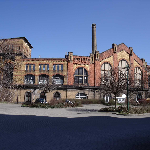Pitch
Green Tech Accelerator - physical space at the intersection of research/ busines to accelerate innovation into products/ services at speed
Description
Summary
The mid-term goal (5-10 years) is to establish a physical place (similar to a multi-disciplinary campus) where green-tech related research findings, and early stage technologies are exposed not only to the general interested public (interactive showroom), researchers' interactions across disciplines at a fairly central point where also industry partners can meet.
The ultimate goal is to scale new technologies, and research findings into innovative products/services that can serve a global market opportunity, and gain public awareness through support by social media which has been built up by HTxA - High Tech x Agency
Additionally it is planned to include a system dynamics focused management school similar, and to offer system dynamics education to make manager, politicians, and general public knowledgable about the system positive change of green tech use (over time). The local university libraries have already material proposed, and sponsored by myself since 2009.
Examples of such are Singularity University, Harvard iLab, MIT Lincoln Laboratory, Cambridge Innovation Center
Category of the Action
Integrated action plan for the world as a whole
What actions do you propose?
Prototype to be established in Dresden - the European major hot spot for semiconductor industry, and all adjacent research and applications.
Concept is already under way, and stakeholders (locally as well as globally engaged).
The working title is LockSchuppen - FutureLab2056
The vision is to establish a 365/24/7 in use accelerator where early stage cutting-edge technology can be tested by the public, and business leaders, feedback pulled in and entrepreneurs from around the world get the opportunities to work on combining research developments, business opportunities, and public needs into new products & services in a XPRIZE competition format.
The building itself will use the latest building technology to achieve climate goals at its best, such as solar electricity, new sustainable building material, use of latest communication technology to overcome commuting, etc.
Where will these actions be taken?
The action will be taken in the city of Dresden, Germany with the aim to provide a role model to be taken to other parts of the world in order to bring technology, entrepreneurship, and a close connection between education/research, business and public together joined by the shared vision to great a better planet with given resources.
Who will take these actions?
Key actors shall be the major universities in Dresden, and the Free State of Saxony, as many of them focus on new emerging technology that are relevant for reaching climate goals at large.
The City of Dresden, which is not only prominently known as an arts city (especially dance, ballet and cultural heritage from the past), and its citizens and visitors shall be amongst the major stakeholders and users of the project.
What are key benefits?
- Awareness building within community about emerging technologies
- Awareness building about new technologies, and innovative solutions coming from Dresden
- Shrink time to market between research finding and first sales
- Scale startups in the green tech domain to global reach
- Make use of vast mashup of global connections in tech world
- Enable local startups (especially outside tech) to learn from tech
- Involve city government, chamber of commerce, business organizations to get involved in upcoming business opportunities, conversations, networks
- Accelerate economic wealth for the region, and beyond by making the Energiewende happen in Saxony (as a role model for other regions)
- Bring knowledge to schools, enabling visits to the show rooms and speakers nights, hackathons, Dresden Innovation Nights, etc.
- Events around green technologies and how they enable citizens, and cities to become sustainable with given resources
What are the proposal’s costs?
Presently the site of the proposed project is on sale (to our knowledge) by German Railway Authorities, and a price tag of around €2 Mio to buy the property is on.
Not included is the complete development of the 17,000 sqm site as a small campus to focus on green technology, and the proposed accelerator (this is intended to establish in the old engine shed with appr. 1,600 sqm usable area).
Time line
- 2014 property is bought
- 2014-2015 competition to find architect(s), and developers
- 2015 clearing of the area to start building
- 2016 start of development
- 2018 START of Green Tech Accelerator & Future Campus (affiliated with the TU Dresden, TU Bergakademie Freiberg, TU Chemnitz, and others)
Since early 2009 building awareness for the project, with several presentations at networking events, running a Twitter and Facebook page
Sub-proposals
Place-Based Creative Problem Solving
How do these sub-proposals fit together?
This sub-proposal was an earlier proposal for the competition in 2011
Explanation of model inputs
References
RoDoLounge - 2011 paper on future economic growth for Dresden & Saxony, un-published
WikiWallWhitePaper - electronic paper about digital knowledge sharing
Innovation Strategy of Free State of Saxony
Team Action Lear(n)ing - ongoing journey since 2008 to establish such a place, and learning along the way about group dynamics, crowdfunding, lean startup, and more
